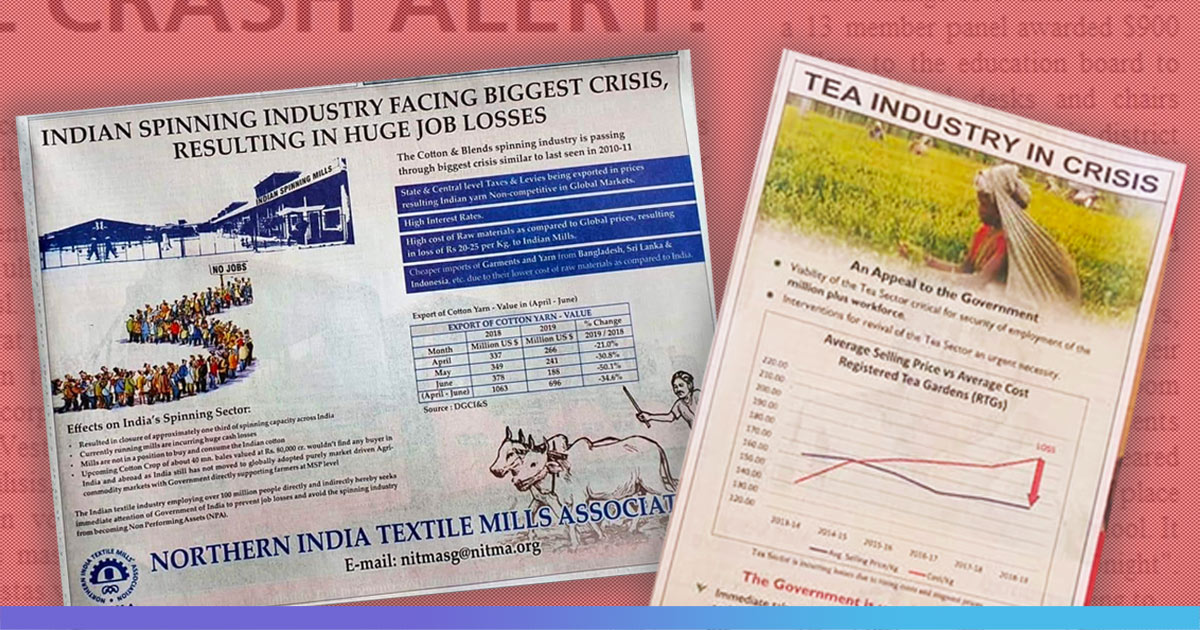Page 3 of The Indian Express, dated August 20, carried an advertisement by Northern India Textile Mills Association (NITMA). It was titled ‘Indian Spinning Industry Facing Biggest Crisis, Resulting in Huge Job Losses’.
This newspaper advertisement spoke about the job crisis faced by the industry, which is otherwise the biggest employer after the agriculture industry in India.
It is one of the rare occurrences when an industry body attempted to draw the government’s attention via a newspaper advertisement.

The Indian Express
‘Avoid Spinning Industry From Becoming NPA’
NITMA has called this the biggest crisis ever, befalling the Cotton and Blends spinning industry, kinds of which was seen during 2010-11. During that year, India’s cotton output had dipped to 332.25 lakh bales.
Citing data from Directorate General of Commercial Intelligence and Statistics (DGCI&S), the association says that there has been a 34.6% drop in the export of cotton yarn value in 2019 (April-June) as compared to the 2018 value for the same period.
Among the various challenges, taxes levied by state and centre, high-interest rates, high cost of raw materials in comparison to global prices and cheaper imports of garments and yarn from countries like Bangladesh, Sri Lanka and Indonesia, have been outlined in the advertisement by NITMA.
The advertisement further notes that about one-third of spinning capacity across India has been closed and those still running are incurring huge cash losses.
“The Indian textile industry employing over 100 million people directly and indirectly hereby seeks immediate attention of the Government of India to prevent job losses and avoid the spinning industry from becoming Non-Performing Asset (NPA),” the advertisement said.
Distress Faced By Textiles Industry
The International Cotton Advisory Committee (ICAC) in February this year said that India’s cotton production is set to drop by 7% due to ‘insufficient rainfall’. This against China’s estimated 1% production increase might cost India its distinction as the world’s largest cotton producer, the report said.
Just last month, a release issued by NITMA said that the textile spinning mills in North India were considering cutting down production and shutting down mills once a week. The decision was made in lieu of poor demand for yarn from overseas market, combined with excess spinning capacity in the country.
The release said, “China, which has been a major importer of Indian yarns for the past few years, has cut down imports in the past few months, thus worsening the situation, leading to the accumulation of yarn stocks in Indian spinning mills.”
The releases further added that some textile units are considering lowering the capacity to even 50% in the wake of the unsafe market situation and to have less borrowing/outstanding and stocks.
Tea Industry’s Public Appeal
On August 1, the Indian Tea Association had issued a similar public appeal. The appeal asked the government to ban expansion of tea estates for at least five years and for the Provident Fund (PF) contribution of workers to be taken over by the state government for at least three years, in order to provide relief to the industry.
Tea Industry in Crisis @CimGOI @PiyushGoyalOffc @pallablochandas @CMOfficeAssam @himantabiswa @cmpatowary @teaboardofindia @Indiantea1881 @TRATocklai pic.twitter.com/2Mq9bQ3D4k
— Vivek Goenka (@VGoenka1) August 2, 2019
Himanta Biswa Sarma, Assam’s Finance Minister had also tweeted that the tea industry in Assam was undergoing critical phase. To relieve the producers, the state government withdrew cess on green leaves, he said in the tweet.
Tea Industry in #Assam is passing through a critical phase. In order to extend support to it, the Assam Assembly has passed a Bill withdrawing cess on green leaves w.e.f. April 2019. The revenue implication for govt for this will be Rs 100 cr per annum.
— Himanta Biswa Sarma (@himantabiswa) August 1, 2019
Also Read: India’s Job Crisis Gets Bigger: Tata Motors Lays Off 1,500 Managers












